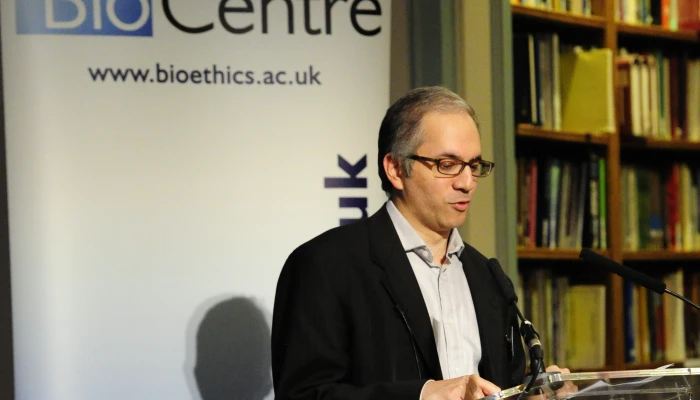
Alison Cooper offers a set of comments and reflections on BioCentre’s symposium on personalised medicine, genes and discrimination.
Sequencing the human genome was a well documented race. Claims of powers to predict and mitigate disease risks and transmission empowering us to launch a pre–emptive strike on cancer invaders and heart attacks, and conquer our health with personally tailored pharmaceuticals. Faced with this prospect, mediated through a vast array of information on the internet, Professor Brenda Almond’s concern about proliferation of the ‘worried well’ is hardly surprising.
This BioCentre live symposium ‘genes, privacy and discrimination’ was tweeted, tiny snippets of information pumped into cyberspace. Read together the stream gives clues about the event, but no sense of the temperature of the room, the speakers’ conversation, the person sitting next to you, or what the wine tasted like. So, it is with genes.
In reality, the DNA in our genes governs both what humans have in common and what makes us individual. However the majority of this is not inevitable or prescriptive. Complex rules determine which characteristics are revealed and when, many requiring specific stimulation and interactions.
Aaron Parkhurst from UCL explored culturally mediated interpretations in the Arab world, where some insist that desirable characteristics are inherited from parents and unappealing ones are fatalistically determined by ‘genes’, on occasions leading to medically dubious advice. I can’t help wondering how this type of interest serving bias functions elsewhere. How many of us sub consciously attribute positive physical attributes, like clear skin and healthy body to their own motivation, while blaming spots and tendency to put on weight on our genes?
According to Dr Adele Langlois, decision making by consensus at UNESCO can be a slow process, with weakened policies and ‘watered down’ wording for diplomatic reasons, where agreement is low. This opens the question about the role of expertise in decision making where outcomes for social and global systems are uncertain, indicating a need for alternative perspectives in tackling global issues like privacy and use of genetic data.
For the average UK citizen, translation of genetic risk into barriers to securing life insurance is an example concern, outlined by Dr Ruth Stirton. A Possible solution is for insurers to apply global genetic risk indiscriminately. One reason being, that assessment based on individual genetic makeup unfairly disadvantages certain people, ignoring lifestyle factors affecting development of all but a handful of serious genetically determined conditions.
A glance at the flip side of assessing health risks based on lifestyle and events suggests excluding people on the basis of what may be the consequence of a transient response to a particular situation, is a more covert form of discrimination. Recognising that lifestyle choices are affected by the interaction of our social, economic and physical environments with our genes is a valuable asset.
While genetic transparency has potential to rattle skeletons in family closets with deafening force, upholding the right not to know seems a peaceful option. On the other hand, patient choice has long been an aspiration for the National Health Service with the holy grail of ‘personalised medicine’ based on genetic profiles fitting the bill.
‘Surely, we need to regulate!’ May be a popular cry, nevertheless, there is a time lag between developing technological capability and the process of codification in law. Tensions arise between governing practices for collecting genetic information for purposes of improving health and preventing crime. Combined with concerns about data security, individual identity is left vulnerable to manipulation and abuse.
When developing policies on collecting and storing genetic information, it might be well to remember it wasn’t Schindler’s publically accessible shopping list for nutritionally enhanced genetically modified vegetables that saved so many lives in 1939. In the interests of a tolerant society sensitive handling of lifestyle information needs to be given equal weight to what might traditionally be considered ‘genetic data’.
In terms of science the fundamental questions about progression from genetic code in our cells to the manifestation of our identities within varied and changing environments, are far from answered.
Educating a diverse a population about the nature of genetic inheritance knowledge can provide immunisation against the less benign implications of its collection. This may include myth busting of some of the more single minded claims, an





